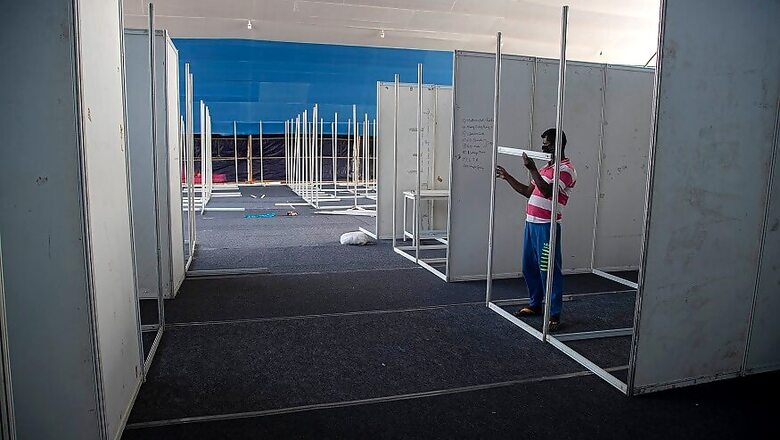
views
Among those suffering from the ongoing lockdown because of the novel coronavirus outbreak is a motley group engaged with the illegal syndicates in Assam that include smugglers, police officers, politicians and members of some eminent organisations.
For the first time in many years, these illicit outfits in the state that engage in import and export of certain commodities to and from neighbouring countries and states have come to a grinding halt.
Certainly, the officers and smugglers involved in the racket have understood that it makes sense to put a stop to these syndicates for the time being. Trucks carrying cattle or betel nut at night and headed towards the border could attract wide media attention and further expose their roles in the activities.
What are these syndicates? They are illicit business networks involving transportation of items either from neighbouring countries or states by dodging the law which includes producing false invoices. While some commodities are sent to destinations outside Assam, a few are exported to Bangladesh.
Two national highways have become synonymous with these syndicates – the highway that originates in Mizoram and passes through Silchar, Shillong and Guwahati and the highway from Moreh in Manipur along the India-Myanmar border that connects Imphal, Kohima and Dimapur with Assam at Numaligarh. Both these arteries are linked to West Bengal through Sagolia and Sreerampur in the twin districts of Dhubri and Kokrajhar in Assam.
A government official in Assam’s border district of Dhubri claimed that 5-6 trucks carrying cattle from West Bengal were spotted heading for the border with Bangladesh at night two days ahead of the lockdown in Assam on March 25 which was drastically less than the quantity ferried earlier. Other items were conspicuous by their absence in the district due to the restriction on the movement of people and vehicles due to COVID-19.
Dhubri – Epicentre of Syndicates
The origin of illegal business syndicates in Assam is unclear although some officials are of the view that they sprung up sometime in the late 1970s at the historic coal hub of Margherita near the state’s border with Arunachal Pradesh.
These syndicates received a boost in 1992 after the United Liberation Front of Asom (ULFA) suffered the first split. A section of the surrendered ULFA (SULFA) functionaries were allowed to establish these operations by imposing taxes on fish, egg and coal that are imported into the state.
The syndicates reached their peak in the late 1990s coinciding with the phase of ‘secret killings’ when another group of the surrendered ULFA (SULFA) was co-opted in a planned manner by security forces to wage a war against ULFA. They have continued in the subsequent years at a lesser scale until about seven years ago when they resurfaced with a renewed momentum.
The epicentre of this thriving illicit trade is Assam’s Dhubri, located 265 kilometres west of Guwahati, owing to its location as a district bordering Bangladesh and West Bengal. On January 21-22, this correspondent along with journalist colleague Jayanta Kalita visited the hotspots for a field study of the phenomenon and to verify the claims made by stories in the local media.
The investigation revealed the existence of five syndicates on cattle, betel nut, coal, fertiliser and boulders. Most prolific is cattle which fetches an income surpassing the other items.
Occasionally, teak wood also passes through the districts to other destinations in the country. Sources revealed that the quantity of betel nut and teak wood passing through Sreerampur Gate in Kokrajhar is several times more than the amount ferried through Dhubri.
While cattle, fertilisers and boulders are loaded onto trucks at locations in north Bengal, betel nut is sourced from Myanmar and transported in a crafty manner by fudging documents. The export of boulders to Bangladesh is not illegal but what is unlawful is the excess quantity that is being traded beyond the permissible limit.
Deep-rooted Nexus
Supply of these commodities is likely to outstrip demand once the gates get opened. So there is a high possibility that these illicit activities would increase after the lockdown is over and also because of the need for funds for the assembly polls in Assam early next year.
The general perception in the state is that many people are involved in the syndicates who get a share of the amount generated in the trade which include some leaders of a few outfits that masquerade as ‘patriotic’ organisations.
The local media in Assam had broadcast stories on the illegal syndicates regularly for almost the past two years. The last was on March 14 when news channel DY365 even named the kingpin in Dhubri which matches with the version of the locals as gathered from the field study. He had recently purchased a plot in Dhubri for construction of a house. The story goes on to name two senior police officials as being involved including a deputy inspector general who was tasked to check the racket.
A few weeks ago, another story named a top politician from eastern Assam as being deeply engaged with the illegal extraction of coal from the collieries of Ledo-Margherita bordering Arunachal Pradesh. On December 6 last year, former chief minister Tarun Gogoi had alleged that the chief minister’s office also gets a share from the syndicates.
There was no reply to an email sent to Assam CM Sarbananda Sonowal ten days ago for a reaction on these stories. So far no legal suit has been slapped by the government against any of the news channels on these allegations.
A former Member of Parliament from the ruling Bharatiya Janata Party, Ramen Deka, had also raised his voice against the betel nut syndicate last year. He had also made a case before a few party leaders to intervene and issue directions to the state government.
A BJP legislator who did not wish to be named said that the syndicates exist for the constant needs of funds. He cited the example of the ‘peace marches’ that were organised by the party in Assam last December during the agitation against the Citizenship Amendment Act. “One rally incurred an expenditure of about Rs 1 crore. Where will the money come from? The state unit cannot ask the high command for funds all the time,” he claimed.
There are also rumours in Assam that a top politician known to be involved in the syndicates would soon launch a TV news channel in the coming months.
(Rajeev Bhattacharyya is a senior journalist in Assam. Views expressed are personal)


















Comments
0 comment